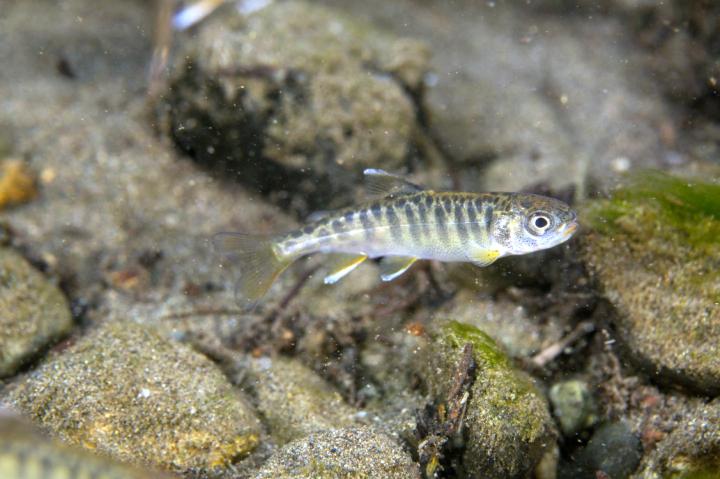Anticipating good conditions for the survival of hatchery-produced Chinook salmon throughout the Sacramento River and tributaries, the California Department of Fish and Wildlife will release both spring and fall-run Chinook during the historic rain and snowfall the state is experiencing. Several releases have already happened, and others are planned over the next few weeks to utilize good in-river habitat conditions for these young salmon.
On Feb. 23, with a series of late-winter storms building, CDFW staff released approximately 1.1 million fall-run Chinook salmon fry into the American River at the Nimbus Fish Hatchery in Sacramento County. These Chinook salmon are part of a pilot study testing new genetic based tagging techniques that if successful, will allow more flexibility in fish release strategies to take advantage of natural high flow events in the future.
It was the first release of fall-run Chinook into the American River in more than three years. Since the spring of 2020, drought conditions have forced trucking of Nimbus Fish Hatchery juvenile salmon to points within the San Francisco and San Pablo bays. These 1.1 million fish are in addition to the normal 4 million smolts released annually from Nimbus Hatchery for mitigation and are also in addition to the 500,000 in increased production scheduled for 2023 to help offset losses to in-river production caused by drought.
In the coming week, CDFW will release 250,000 fall-run Chinook salmon from the Feather River Hatchery. These fish are part of the 3.1 million fish that were raised above and beyond the hatchery mitigation requirement. They will be taken to the Sutter Bypass for release where they can directly enter rearing habitat resulting from rainfall the region experienced in early March. The expectation is these fish will be able to utilize this habitat to grow to smolt size before entering the Delta and heading toward the ocean.
An additional 900,000 of these 3.1 million fish will be released in the Feather River in early April as pre-smolts when favorable conditions are expected to continue based on current snowpack and reservoir conditions. The remaining 2.9 million additional fish as well as the six million mitigation fall-run Chinook, will be trucked to the San Pablo and San Francisco Bays as smolts for release.
This week will also be the start of the annual spring-run Chinook salmon releases in the Feather River from the hatchery. Over the course of the next few weeks approximately two million spring-run Chinook salmon will be released at several release locations along the Feather River. The favorable conditions in the Feather River and bypasses should provide good rearing habitat allowing these fish to grow and increase survival rates.
“By putting these fish out into the river now, they are going to experience the natural environment of our rivers as natural-origin fish would and will be able to take advantage of the high flows we’re getting with these storms,” said Jay Rowan, who oversees CDFW’s Fisheries Branch.
CDFW expects survival rates for these Chinook salmon to be very high given the increased flows and expects to see the benefits of these early releases three years from now when the adults return to complete their lifecycle.

